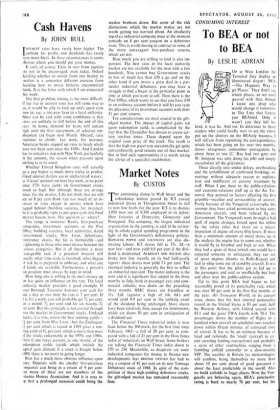Cash Havens
By JOHN BULL
It isn't, of course. Exits in foto from equities ire not to be encouraged, even today. Indeed leciding whether to switch from one market to tnother is a somewhat different exercise from leciding how to invest hitherto uncommitted funds. It is the latter with which I am concerned this week.
The first problem, timing, is the most difficult. If the rise in interest rates has still some way to ;o, it would be silly to lock up one's spare cash now in, say, a one-year loan to a local authority. What can be said with some confidence is that rates are unlikely to fall before the end of this year. At home, demand for loans will remain 'sigh until the first repayments of selective em- ployment tax begin next March. Abroad, rates ontinue to climb: last week, for instance, American banks stepped up rates to levels which have not been seen since the 1920s. And London has to remain in step with New York, particularly In the autumn, the season when pressure upon sterling is at its worst.
Whether United Kingdom rates will actually go a peg higher is much more tricky to predict. Fixed interest dealers are in unchartered waters: as 'Custos' pointed out here last week, at no point since 1731 have yields on Government stocks stood so high. But although these are strange times for the market, I do not think that we will see an 8 per cent Bank rate nor much of an in- crease in rates except in sectors which have lagged behind (building societies, for instance). So it is probably right to put spare cash into fixed interest havens now. The question is: where?
The range is immense. Banks, hire-purchase companies, investment accounts at the Post Office, building societies, local authorities, dated Government stocks, War Loan, debentures, (reference shares, the list is formidable—and "Tightening to those who must choose between the arious categories. But it all becomes a more aanageable task if a potential investor will pecify what time-scale is involved, what degree f risk he is prepared to embrace, and what size if funds are available. Furthermore, a person's :ax position must always be kept in mind.
How long one is willing to tie one's money up :-or has quite an influence on the rate. The local authority market provides a good example. If /our Borough Treasurer borrows your cash for ust a day or two then the rate is 7 per cent. If t is for a week, you will probably get 74 per cent, or a month 74 per cent and for six months 74 ler cent. But this principle is not carried through nto the market in Government stocks. Undated .tocks, it is true, return the best running yields— 'I per cent from War Loan—but the Exchequer 4- per cent which is repaid in 1969 gives a run- ling yield of 64 per cent, which is more than most if the stocks redeemable in the 1970s and 1980s. :iven if one takes account, as one should, of the edemption yields (yields which include the .apital gain element if a stock is bought below ;100) there is no merit in going longer.
Risk has a much more obvious influence upon ates. Deposits with the smaller hire-purchase ompanies can bring in a return of 9 per cent.
:tit many of these are not members of the inance Houses Association. And it is easy to
.z.e that a prolonged recession could bring the weaker brethren down. But some of the 'risk distinctions which the market makes are not worth getting too _worried about. An absolutely top-class industrial company must at the moment concede an 8 per cent coupon on a debenture issue. This is worth having in contrast to some of the more extravagant hire-purchase returns, which are not.
How much you are willing to lend is also im- portant. The best rates in the local authority market are not available for the man with a few hundreds. You cannot buy Government stocks in lots of much less than £50 a go and on the other hand if you invest a great deal in a par- ticular industrial debenture, you may have a struggle to find a buyer at the particular point in time at which you want to sell. Then there is the Post Office, which wants to see that you have £50 in an ordinary account before it will let you taste the pleasures of its investment accounts with their 51 per cent returns.
Tax considerations are most crucial in the gilt- edged market. The impact of capital gains tax upon redemption yields is complicated by the fact that the Chancellor has chosen to create cer- tain tax-free zones. These depend upon the original issue price of the stock. The result is that the high tax payer can occasionally get quite extraordinarily good returns out of that -market. But to find such opportunities it is worth taking the advice of a specialist stockbroker.






























 Previous page
Previous page